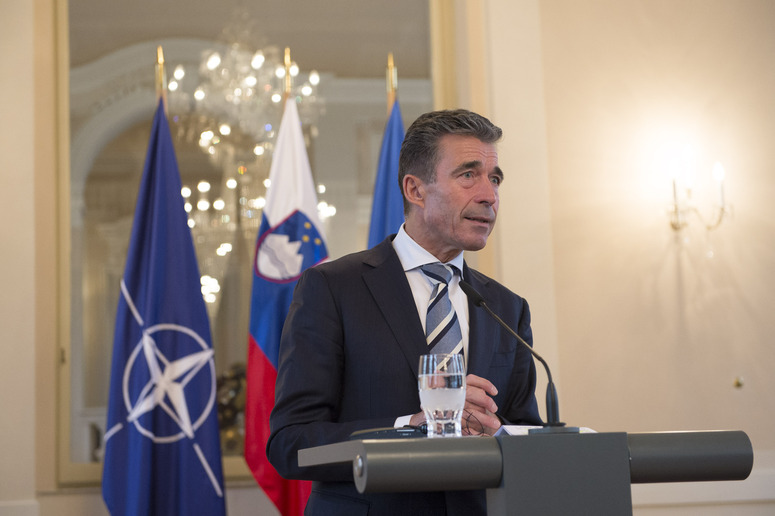Opening remarks
by NATO Secretary General Anders Fogh Rasmussen at the Press Point with Slovenian Prime Minister Alenka Bratušek in Ljubljana, Slovenia

Prime Minister,
Thank you very much indeed for your kind words. I am afraid that I brought snow to Ljubljana this morning, but I thank you very much for a warm welcome.
I have been looking very much forward to visiting Slovenia, right at the beginning of this important year 2014.
This year we mark, as you mentioned, the tenth anniversary of Slovenia’s accession to NATO. Your accession, together with 6 other nations, has reinforced regional and Euro-Atlantic security. Over this past decade you have shown yourself to be a dedicated and dependable Ally.
Slovenia has made a strong contribution to our mission in Kosovo. You have played your part in our mission in Afghanistan. I know that one of your soldiers was injured recently. I wish him a speedy recovery. And let me take this opportunity to express our gratitude for the service and sacrifice of your servicemen and women in Afghanistan. We are very grateful for Slovenia’s long-standing contribution to our mission in Afghanistan. Your soldiers have made a difference and we highly appreciate that commitment to our mission in Afghanistan.
And you have also enriched our political debates and our partnerships. I thank you for your dedication and your commitment. And I look forward to further strong engagement this year as we prepare for a very important NATO Summit in the United Kingdom.
In September, we will meet in Wales to shape Future NATO. We will take decisions to make sure that our Alliance is ready, robust and rebalanced – fit to face whatever threats we encounter.
For 65 years, NATO has provided the security foundation on which freedom, democracy, and prosperity have flourished in Europe. And we cannot take our security for granted.
At the Wales summit, we will build on past achievements to face the challenges of the future. We will turn a new page in our relationship with Afghanistan, as we conclude our combat mission there and remain committed to help Afghanistan in different ways in the years to come.
We will make our relationship with our partner countries even broader, deeper and stronger, so that we build on the experience of 20 years of operating together. And we will make sure that we have the capabilities we need to tackle the full range of threats, including missile defence and cyber defence.
I know the economic hardship which many Allies have suffered, including Slovenia. And I am grateful for your continued support to our operations, despite the tough times.
Slovenia is also contributing to key NATO initiatives, such as our Allied Ground Surveillance programme to acquire unarmed reconnaissance drones.
This is the way forward: to pool our resources and our expertise, so that we develop together the capabilities which we would not be able to afford alone. Security has a cost, but the price of insecurity is much, much higher.
So Prime Minister, I count on your continued active and positive engagement, as we prepare a successful Summit in September. Thank you.
Q: Hello, the question is, in the last years, NATO has been facing the reduction in financial capabilities. We have heard the phrases from Brussels “war on funds”, actually I am questioning how well is Slovenia doing in the “war on funds”? Then which modifications are required, since it no secret that we spent almost 80% of defence budget on salaries of Slovenia soldiers. Thank you.
A: Of course, in today’s meeting, I have conveyed the same message to the Slovenia government as I have conveyed to all other governments within our Alliance, namely, that I am concerned about declining defence budgets. That’s not only a challenge in Slovenia, but it is a challenge all over. All defence ministers all over the Alliance, almost all defence ministers within our Alliance, our faced with declining defence budgets. It is a matter of concern because we will need sufficient investments in defence if we are to address future security challenges effectively and continue to protect our populations effectively against new threats, like missile threats, like cyber threats, like terrorism. So that’s why I encourage all governments to find ways and means to gradually increase investments in defence once the economies recover. As a former prime minister, I know very well what is the real challenge politically if you are to cut deficits to stop debt, to bring your fiscal house in order, then you also have to cut expenditure across the board including social programmes, welfare programme, health, education and then of course it is difficult to suggest that the minister of defence should be exempted from that exercise. I know very well what is the political challenge, nevertheless I think there is a bottom line as to how little you can spend on defence and still live up to requirement. This is the message I have conveyed to the Slovenia government but that is a message I conveyed to all governments. Final word on that, I am realistic, I don’t expect much more money for defence in the near future. And that’s why we have to get more out of the money we actually spend on defence and that’s why it is so important to engage in multinational projects, in collective projects. It will be increasingly difficult for individual nations to purchase necessary military equipment in the future. But if we pool resources, if we help each other, in what we call smart defence projects, then we can. We call it smart defence because that’s a smarter way of spending money, so, we should get the most out of the money we do have.
